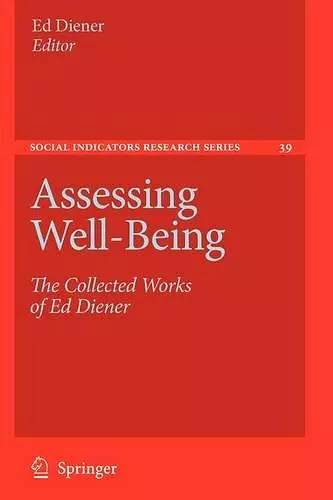Assessing Well-Being
The Collected Works of Ed Diener
Format:Paperback
Publisher:Springer
Published:9th Jun '09
Currently unavailable, and unfortunately no date known when it will be back

The Sandvik, Diener, and Seidlitz (1993) paper is another that has received widespread attention because it documented the fact that self-report well-being scales correlate with a number of other methods of measuring the same concepts, such as with reports by knowledgeable “informants” (family and friends), expe- ence sampling measurement, and the memory for good versus bad life events. A single factor was found to underlie measures using different methods, and a n- ber of different well-being self-report measures were found to correlate with the non-self-report measures. Thus, although the self-report measures of well-being are imperfect, and can be in uenced by response artifacts, they have substantial validity as shown by their correlations with measurements based on alternative methods. Whereas the Pavot and Diener article reviewed the Satisfaction with Life Scale, the Lucas, Diener, and Larsen (2003) paper reviews various approaches to assessing positive emotions. As we wrote in the chapter in this volume in which we present new measures, we do not consider any of the existing measures of positive affect to be entirely acceptable for measuring subjective well-being in the affect area, and that is why we have created and validated a new measure.
From the reviews: “Assessing Well-Being, is concerned with the measurement of life satisfaction. … Also, newly written, they point the way for future research. … Certainly academic researchers interested in well-being will find them extremely useful. … The reprinted book chapters are not so readily available, so their inclusion is a real plus. The audience should extend beyond research psychologists and include policy makers as well as interested members of the general public. … the collected works of Ed Diener are timely, impressive, and useful.” (Christopher Peterson, PsycCRITIQUES, Vol. 54 (50), 2009)
ISBN: 9789048123537
Dimensions: unknown
Weight: 900g
274 pages
2009 ed.